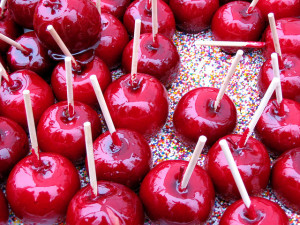
CC image Candy Apples courtesy of Andrea Williams on Flickr. Some rights reserved.
I saw a piece recently discussing the incredible shrinking word count for the children’s storybook. The topic resonated with me, although I am not a children’s writer, because I get the feeling a similar trend is happening in novels and some sectors of nonfiction books. The crux of the matter seems to be that too long is unacceptable, and will turn off the audience.
Let me point out for a moment that “too long” is a relative and subjective measurement. Someone’s Harriet the Spy is another person’s War and Peace. And some may prefer War and Peace over anything bite-sized.
It’s true the media has been supporting a move towards the bite-sized. News stories on American TV are quick and punctuated by commercials. In total, the coverage lasts less than an hour. Social media platforms for the pithy and quickly witty proliferate: Twitter by definition seeks a short hit, Facebook trends favor the visual and the funny, Vine (6 second videos) is a thing, texting (with a character limit) is the new telephone call.
Flash writing has also been rising in interest among readers and writers. As a method of writing, flash can be quite satisfying: been there, completed that, all in my lunch break (I can go back to edit later, of course, but you get the idea). As a method of reading, flash also satisfies—like much social media—the desire for a quick diversion, something we can access easily on small devices like our phones without having to focus too much attention or the work of a “real” computer on the event.
Shorter content is like candy. Longer content is a meal. We’re not always hungry for a full meal—occasionally, that’s too much food. Candy, meanwhile, is known for its addictive properties, the way it pretends to satisfy and always leaves you wanting more instead (my father, when we kid him about the tiny portions of ice cream he serves himself, famously says, “there is no such thing as enough ice cream. No matter how much you eat, you always want to have a little more. So why do I need a big portion?”). There is almost no time when we admit we’ve had enough (or too much) candy. We feel vaguely sick after a while, and have to take a break… we feel too sick to have a real meal, either.
A meal takes time to prepare and ideally takes time to truly enjoy. A meal involves care and attention, often the participation of other people, and the opportunity to savor. As payback, the meal satisfies, often for a long period of time. If I have a good meal, and I enjoy the preparation and the eating of it, I may spend time dwelling on the positive experience of the meal, and I also don’t feel like having another immediately afterwards. I need time to digest it. Eventually I’ll get hungry again, but for now that meal stays with me and sustains me.
Candy sometimes is good. I think we can and should give ourselves small bursts of pleasure and luxury. I believe that we should pamper ourselves and take the opportunity to make a special moment, an exception, to do something fun that may not be the best for, say, our dental health if we overdo it. I just don’t think candy replaces meals in any way. Just as an obsession with word count doesn’t replace a true story. As someone who enjoys both preparing and savoring a real meal, I hope I am not alone in this.
